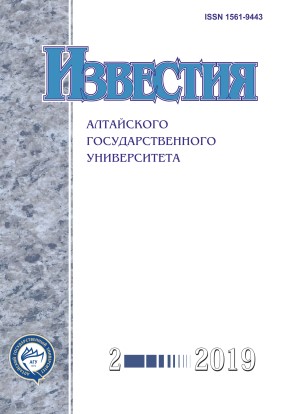The L.N. Zherebtsov's Expedition in the Altai Region in 1969 in the Context of the Study of the Ethno-areal Groups of the Komi People
Abstract
The study of the ethno-areal group of the Altai Komi on the basis of scientific and organizational documentation of the 1960-1980-s of the Department of Ethnography and Archeology of the Komi Branch of the USSR Academy of Sciences is presented in the article. In the summer of 1969 the ethnographic group of the Siberian folklore and ethnographic group under the leadership of L.N. Zherebtsov conducted researches in the Altai Region. It was the only complex expedition of the Komi scientists where the questions of preservation of language, folklore, features of material culture and self-awareness of different generations of the inhabitants of Zyryanovka, Novozyryanovo villages, descendants of immigrants from the Komi Region at the end of 18th — the beginning of the 20th centuries were considered. These studies make a significant contribution to solving the problem of ethnogenesis and ethnic history of the Komi people. The materials of the expedition of 1969 contain material of surveys of the population of the villages of the Altai Region. This information helps to assess the content of the historical memory of the representatives of different generations of immigrants from the Komi Region, their ethnic and cultural orientations in the late 1960's. It shows the multiplicity of forms of ethnic identity and the formation of regional (Siberian) identity in the ethno-areal group of the Altai Komi.
Downloads
Metrics
References
Чешко С.В. От советской этнографии к российской этнологии // Этнологическое обозрение. 2002. № 2.
Материал для обсуждения на Международном симпозиуме «Востоковедение в России и странах СНГ на рубеже веков. Проблемы и перспективы». Казань, 2-5 июля 2007 г. [Электронный ресурс]. URL: http://ansya.ru/health/vostokovedenie-v-komissii-po-izucheniyu-plemennogo-sostava-nas/main.html.
Список народностей Союза Советских Социалистических Республик / под ред. И.И. Зарубина. Л., 1927. (АН СССР. Комиссия по изучению племенного состава населения СССР и сопредельных стран. Труды комиссии. Вып. 13).
История ИЭА РАН // Официальный сайт ИЭА РАН [Электронный ресурс]. URL: http://iea-ras.ru/index.php?go=Content&id=13.
Конаков Н.Д., Котов О.В. Этноареальные группы коми: формирование и современное этнокультурное состояние. М., 1991.
Конаков Н.Д., Шабаев Ю.П. История этнографического изучения народов коми // Очерки по истории изучения этнографии коми. Сыктывкар, 2007.
Документальная история Коми научного центра УрО РАН. Коми филиал АН СССР в 1965-1987 гг. / сост. Л.П. Рощевская, А.А. Бровина, А.В. Самарин, Э.Г. Чупрова, Т.П. Филиппова, Н.П. Миронова. Сыктывкар, 2011.
Жеребцов Л.Н. Дороги этнографа. Сыктывкар, 2005.
Савельева Э.А. Любомир Николаевич Жеребцов // Очерки по истории изучения этнографии коми. Сыктывкар, 2007.
Ученые Института языка, литературы и истории Коми научного центра УрО РАН : биографический справочник. Сыктывкар, 2000.
Жеребцов Л.Н. Историко-культурные взаимоотношения коми с соседними народами. М., 1982.
План научно-исследовательских работ Коми филиала АН СССР на 1969 г. // Научный архив Коми НЦ УрО РАН. Ф. 1. Оп. 1. Д. 958.
Жеребцов Л.Н. Научный отчет Сибирского этнографического отряда об итогах 1969 г. // Научный архив Коми НЦ УрО РАН. Ф. 1. Оп. 13. Д. 194.
Жеребцов Л.Н. Отчет отдела этнографии и археологии Коми филиала АН СССР о выполнении плана научно-исследовательских работ за 1969 г. // Научный архив Коми НЦ УрО РАН. Ф. 1. Оп. 1. Д. 964.
Жеребцов Л.Н. Отчет (заключительный) о научно-исследовательской работе по теме «Этнокультурные связи народа коми» за 1966-1970 гг. 1971 г. // Научный архив Коми НЦ УрО РАН. Ф. 5. Оп. 2. Д. 6.
Жеребцов Л.Н. Историко-культурные связи народа коми : итоговый отчет за 1971-1975 гг. // Научный архив Коми НЦ УрО РАН. Ф. 5. Оп. 2. Д. 142.
Жеребцов Л.Н. Заключительный отчет по теме: «Историко-культурные взаимоотношения коми с соседними народами» 1980 г. // Научный архив Коми НЦ УрО РАН. Ф. 5. Оп. 2. Д. 264.
Альбом 1 (Приложение к отчету 1969 г. Сибирского этнографического отряда) // Научный архив Коми НЦ УрО РАН. Ф. 1. Оп. 13. Д. 195.
Миллер Г.Ф. История Сибири. Т. 1. 2-е изд., доп. М., 1999.
Народы Сибири / под ред. М. Г. Левина, Л. П. Потапова, М. ; Л., 1956.
История Коми с древнейших времен до современности. Т. 1. 2-е изд., испр. и доп. Сыктывкар, 2011.
Дутчак Е.Е., Львова Э.Л., Нам И.В. Сибирская региональная идентичность — фактор конфликта или ресурс формирования общероссийской идентичности? // Известия Иркутского гос. ун-та. Серия: История. 2012. № 2 (3). Ч. 1.
Бочаров А.В. Сибирская региональная идентичность в контексте исторического сознания (по результатам контент-анализа томских СМИ) // Вестник РУДН. Серия: Социология. 2011. № 4.
Вдовин А.И. Подлинная история русских. XX век. М., 2010.
Izvestiya of Altai State University is a golden publisher, as we allow self-archiving, but most importantly we are fully transparent about your rights.
Authors may present and discuss their findings ahead of publication: at biological or scientific conferences, on preprint servers, in public databases, and in blogs, wikis, tweets, and other informal communication channels.
Izvestiya of Altai State University allows authors to deposit manuscripts (currently under review or those for intended submission to Izvestiya of Altai State University) in non-commercial, pre-print servers such as ArXiv.
Authors who publish with this journal agree to the following terms:
- Authors retain copyright and grant the journal right of first publication with the work simultaneously licensed under a Creative Commons Attribution License (CC BY 4.0) that allows others to share the work with an acknowledgement of the work's authorship and initial publication in this journal.
- Authors are able to enter into separate, additional contractual arrangements for the non-exclusive distribution of the journal's published version of the work (e.g., post it to an institutional repository or publish it in a book), with an acknowledgement of its initial publication in this journal.
- Authors are permitted and encouraged to post their work online (e.g., in institutional repositories or on their website) prior to and during the submission process, as it can lead to productive exchanges, as well as earlier and greater citation of published work (See The Effect of Open Access).








